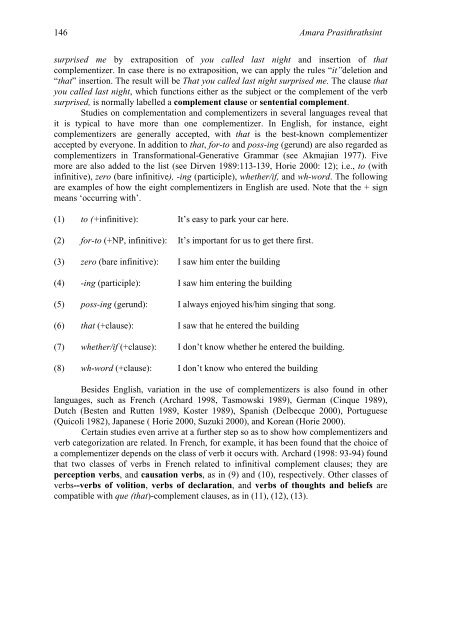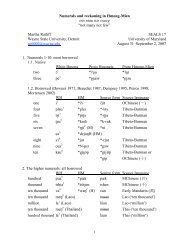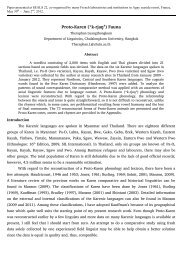proto-southwestern-tai revised: a new reconstruction - seals 22
proto-southwestern-tai revised: a new reconstruction - seals 22
proto-southwestern-tai revised: a new reconstruction - seals 22
You also want an ePaper? Increase the reach of your titles
YUMPU automatically turns print PDFs into web optimized ePapers that Google loves.
146 Amara Prasithrathsint<br />
surprised me by extraposition of you called last night and insertion of that<br />
complementizer. In case there is no extraposition, we can apply the rules “it”deletion and<br />
“that” insertion. The result will be That you called last night surprised me. The clause that<br />
you called last night, which functions either as the subject or the complement of the verb<br />
surprised, is normally labelled a complement clause or sentential complement.<br />
Studies on complementation and complementizers in several languages reveal that<br />
it is typical to have more than one complementizer. In English, for instance, eight<br />
complementizers are generally accepted, with that is the best-known complementizer<br />
accepted by everyone. In addition to that, for-to and poss-ing (gerund) are also regarded as<br />
complementizers in Transformational-Generative Grammar (see Akmajian 1977). Five<br />
more are also added to the list (see Dirven 1989:113-139, Horie 2000: 12); i.e., to (with<br />
infinitive), zero (bare infinitive), -ing (participle), whether/if, and wh-word. The following<br />
are examples of how the eight complementizers in English are used. Note that the + sign<br />
means ‘occurring with’.<br />
(1) to (+infinitive): It’s easy to park your car here.<br />
(2) for-to (+NP, infinitive): It’s important for us to get there first.<br />
(3) zero (bare infinitive): I saw him enter the building<br />
(4) -ing (participle): I saw him entering the building<br />
(5) poss-ing (gerund): I always enjoyed his/him singing that song.<br />
(6) that (+clause): I saw that he entered the building<br />
(7) whether/if (+clause): I don’t know whether he entered the building.<br />
(8) wh-word (+clause): I don’t know who entered the building<br />
Besides English, variation in the use of complementizers is also found in other<br />
languages, such as French (Archard 1998, Tasmowski 1989), German (Cinque 1989),<br />
Dutch (Besten and Rutten 1989, Koster 1989), Spanish (Delbecque 2000), Portuguese<br />
(Quicoli 1982), Japanese ( Horie 2000, Suzuki 2000), and Korean (Horie 2000).<br />
Cer<strong>tai</strong>n studies even arrive at a further step so as to show how complementizers and<br />
verb categorization are related. In French, for example, it has been found that the choice of<br />
a complementizer depends on the class of verb it occurs with. Archard (1998: 93-94) found<br />
that two classes of verbs in French related to infinitival complement clauses; they are<br />
perception verbs, and causation verbs, as in (9) and (10), respectively. Other classes of<br />
verbs--verbs of volition, verbs of declaration, and verbs of thoughts and beliefs are<br />
compatible with que (that)-complement clauses, as in (11), (12), (13).





